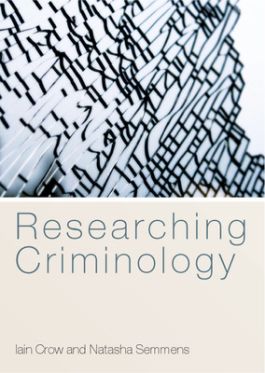Researching Criminology
Chapter 1. The Research Process
1. What is Research?
2. Researching Criminology
3. Types of Inquiry and Types of Data
4. Research as a Process
Chapter 2. The Principles of Researching Criminology
1. The Research Question
2. Choosing a Research Strategy
3. Method Selection and Data Collection
4. Data Analysis and Inference
Chapter 3. Designing Criminological Research
1. What is Research Design and Why is it Important?
2. Main Types of Empirical Inquiry
3. Some Common Kinds of Research Design
4. Choosing a Research Design: an example
5. Sampling.
6. Researching Criminology Ethically
Chapter 4. Criminological Evaluation
1. Defining Terms
2. The Evaluation Paradigm
3. Evaluation and Theory
4. Doing Criminological Evaluation
PART TWO: COLLECTING AND ANALYSING MATERIAL
Chapter 5. Researching by Reading
1. Reviewing the Literature Critically.
2. Analysing Other People’s Data
3. Analysing Documents
Chapter 6. Researching by Looking
1. Introduction: Watch and Learn
2. The Science of Observation? Epistemology and Research Design
3. Methodological Decisions
4. Data Collection
5. Data Analysis
6. The Disadvantages of Observation
Chapter 7. Researching by Asking and Listening
1. Introduction
2. Interviewing
3. Group Interviews and Focus Groups
4. Questionnaires
Chapter 8. Analysing Criminological Research
1. About Analysis
2. Analysing Quantitative Material: An Introduction
• Analysing A Single Variable
• Analysing Two Variables
• Analysing Three or More Variables
3. Analysing Qualitative Material: An Introduction
• The process of qualitative analysis (coding, categorisation, counting, computer packages)
• Interpreting Results, Drawing Conclusions and Presenting Findings
PART THREE: REAL WORLD RESEARCH
Chapter 9. Researching Offenders and Employment
1. Background to the Project, and What it Shows
2. Theoretical Basis
3. Hypotheses
4. Research Design
5. Research Methods
6. Operationalising the Design and Conducting the Study
7. Results
8. Summary
Chapter 10. Researching the Youth Court
1. Background to the Project
2. Theoretical Context
3. Research Design and Methods
4. Analysis
5. Results
6. Comments
Chapter 11. Researching a Community Safety Programme
1. Background to the Project
2. Theoretical Context
3. The Research
4. Results
5. Discussion
Chapter 12. Researching the Fear of Crime
1. Background to the Project
2. Theoretical Context
3. The Research
4. Analysis and Results
5. Discussion
Tina Patel, Liverpool John Moores University
"This book provides an essential tool for undergraduate students embarking upon their own research projects in Criminology. It provides clear and informative guidance on a range of research methods and designs to assist students in their own criminological endeavours."
Jacki Tapley, University of Portsmouth
- How do criminologists go about studying crime and its consequences?
- How are programmes for offenders and communities evaluated?
- How can you collect and analyse criminological material?
Designed especially for students on criminology and criminal justice courses, and professionals working in the field, Researching Criminology emphasises the importance of research as an integrated process. It looks at the ways in which a mixture of investigative methods can be used to analyze a criminological question.
Written by two experienced researchers and lecturers Researching Criminology is a comprehensive introduction to the aims, principles and methods of doing criminological research. The book covers all the key topics that you will encounter when researching crime. Individual chapters include material on:
- The research process
- Principles of researching criminology
- How to design criminological research
- Evaluation research
- Researching ethically
- A glossary of essential key concepts

